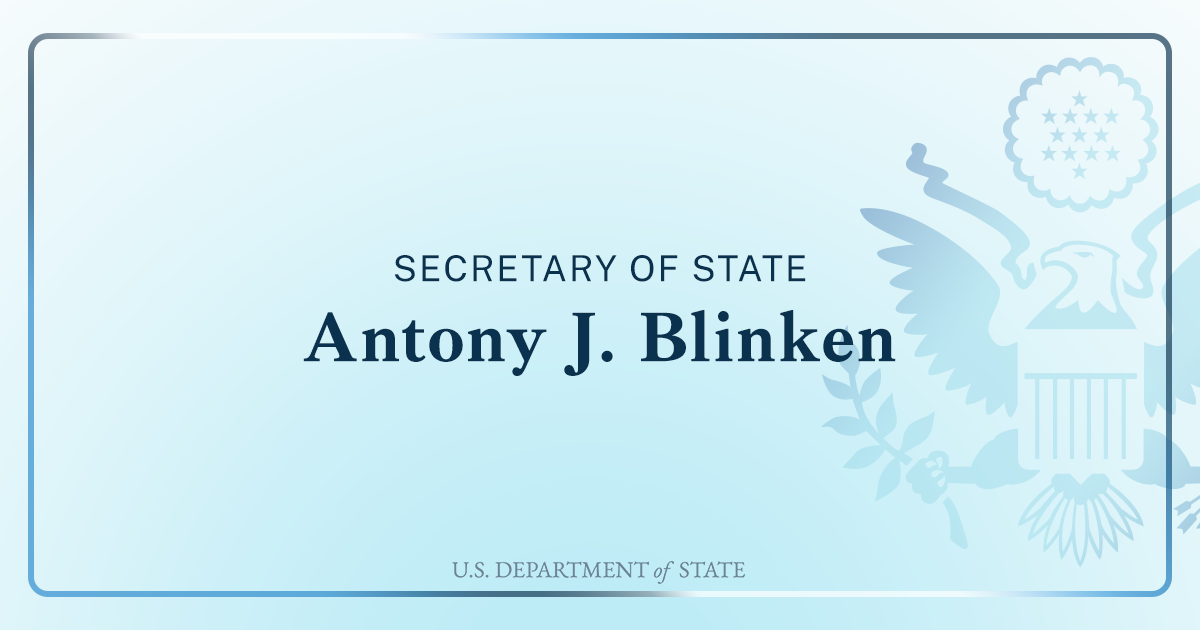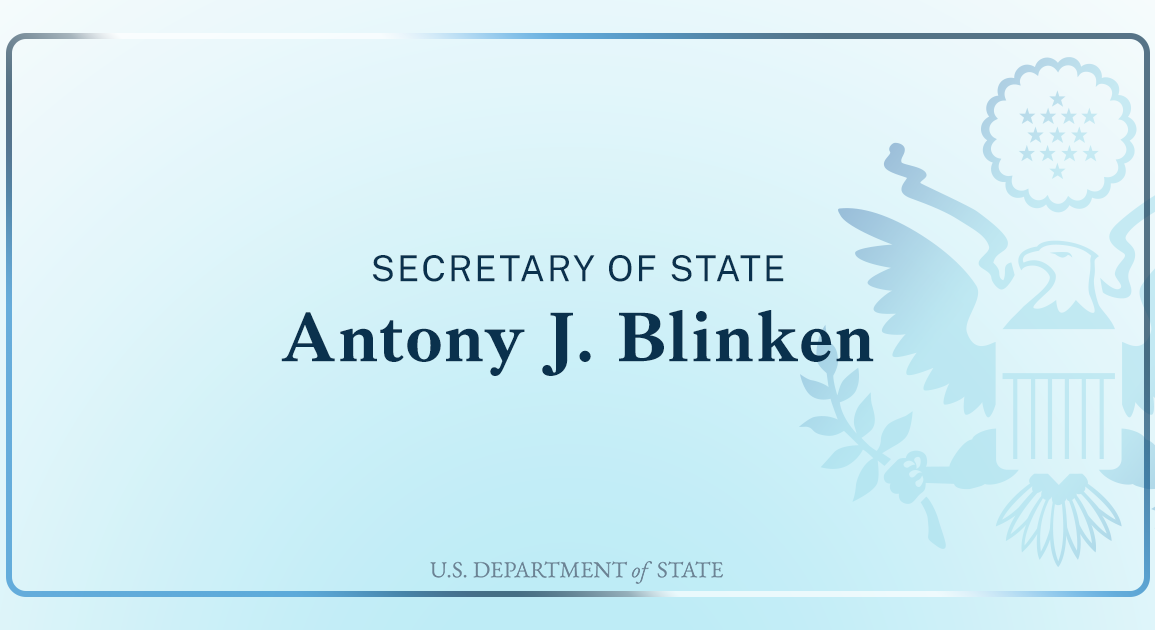
QUESTION: And Nancy’s sticking around because our next guest is Secretary of State Antony Blinken, in town because New York is beautiful in the fall, of course, and also a little thing called the UN General Assembly.
Mr. Secretary, thank you very much for being here.
SECRETARY BLINKEN: Great to be with you. Thanks.
QUESTION: We just saw the amazing footage of these Americans returning to U.S. soil, freed from Iran after being detained there. In the exchange, the U.S. is unfreezing $6 billion in Iranian oil proceeds. Help the average American understand how you’re possibly going to be able to control how that money is spent.
SECRETARY BLINKEN: Well, two things. First, for me, getting these Americans home – one who’d been imprisoned in Iran for more than eight years – having them reunite with their families – I know the families; I’ve talked to them – getting a chance to speak to those that we got out of Iran as soon as they touch ground in Doha on their way back to the United States, it was just a very powerful moment. And it’s a reminder of the human dimension of everything we do.
Now, as to the monies involved, two things. First, these are Iranian funds that they got from selling oil that were stuck in a bank account in South Korea. From day one for our sanctions, this has always been exempt, being able to use money, including by Iran, for humanitarian purposes – it’s always been exempt from our sanctions. They’ve actually been entitled to use this money all along. But for practical, technical reasons, they weren’t able to. So the monies were moved from one bank account in South Korea to another – not a single U.S. taxpayer dollar. And we made an arrangement with the bank in question – this is a bank in Qatar – to make sure that we would have clear visibility over the way the money is spent. And if it’s not being spent for humanitarian reasons, it’s not being spent for food, medicine, other things, it’ll get shut down.
QUESTION: But Mr. Secretary, I mean, you know how money works. If I give you $5 that you can spend on humanitarian aid, that frees up another $5 to spend on, I don’t know, drones, missiles, weapons that you might send to your friend Russia to fight in Ukraine.
SECRETARY BLINKEN: Again, even allowing for that, these monies, these proceeds from Iran’s oil sales, they’ve always been entitled to use. Just as a practical matter, they couldn’t. But the other thing is whether we like it or not – and we don’t like it – the Iranians have always found ways to use money, whether there are sanctions or not, for military purposes. And we are taking steps every single day around the world to try to stop or disrupt the kinds of things that they’re engaged in – support for terrorism, destabilizing countries – that are having a profoundly negative effect around the world.
QUESTION: Don’t – does it not endanger the next American to travel to a country that may not be our friend? Does it not encourage more hostage taking, in essence?
SECRETARY BLINKEN: These are hard decisions – hard decisions for the President to make. He’s made them – we now have more than 30 Americans who were being unjustly detained in prisons around the world, potentially rotting away, who are now home as a result of those decisions. But it’s also very important that we do what we’re doing, which is, one, going after any of those that we find who are engaged in unlawfully detaining Americans with sanctions, with restrictions on their travel; second, here in New York at the UN General Assembly, all these countries of the world coming together, we’re bringing – along with Canada – a number of countries together to try to establish much more clearly in international law that the practice of taking people, using them in fact as political hostages is absolutely unacceptable, and also getting countries to say: If you take one of our people, then all of us together will come down on you.
The final thing is this: Countries that do this – the Irans, the Russias of this world – they turn themselves into even greater pariahs. They’re isolating themselves, because ultimately people are not going to want to set foot in those countries if they know they can be thrown in jail for no reason.
QUESTION: You’re asking Congress to approve $24 billion in new aid to Ukraine. And yet, two weeks ago, Volodymyr Zelenskyy had to fire his defense minister. A couple days ago, he fired all six of the deputy defense ministers. Corruption, apparently, in the defense ministry is rampant. How do you convince Congress that this money is going to be well spent by Ukraine?
SECRETARY BLINKEN: The very fact that President Zelenskyy has taken action apparently to deal with instances of corruption is evidence of the fact the Ukrainians take this deadly seriously. And they know that the United States and dozens of other countries around the world that are supporting Ukraine wanted to make sure that the support we’re giving them is being used the right way.
Second, we have in place in Ukraine teams on the ground, as well as other countries doing the same thing, to verify that the money is being spent for the purposes that we’re sending it to Ukraine for. And I’ve talked to members of Congress who have gone to Ukraine, and they’ve seen what we’re doing to make sure the money is well accounted for. They come back very impressed with these controls, with these measures, and they’ve told us that they haven’t seen anything as effective in other places in the past where we supported countries who were being the victims of aggression.
QUESTION: But clearly it had to get pretty bad, right, for Zelenskyy to basically wipe out the entire leadership of the defense ministry that’s in charge of waging this war?
SECRETARY BLINKEN: So whether all of the folks in question who were let go were let go because of corruption, that’s an open question. I think there are other reasons in some cases. But to us, to me, the fact that Zelenskyy’s taking resolute action wherever he sees something, that’s proof that they’re taking this seriously, they want to make sure that we know they’re spending our money wisely.
QUESTION: Mr. Secretary, while we have you here, another question I think Americans are taking very seriously right now is the question of the President’s health and vigor at this stage. You’ve known President Biden for a long time. You work closely with him; you travel abroad with him. Is he up for another four years as a matter of health and energy?
SECRETARY BLINKEN: I can tell you this: We just came back from a trip that took us, took the President from India, to Vietnam, to Anchorage, Alaska, and then back home to Washington. My problem was keeping up with him. And I’ve seen this around the world. I just came back from Ukraine myself. There’s a train ride to go to Ukraine from Poland – almost 12 hours on the train. And just a few months ago, the President was in Ukraine, crossed the Atlantic to Poland, in a car two hours to get to the train, 10 hours on the train, and then to Kyiv in the middle of the Russian aggression, then back out the same way.
As I said, I’ve been going around the world with him for more than 20 years, and I still have trouble keeping up.
QUESTION: All right. Secretary Blinken, I mean it; New York is beautiful in the fall. I hope you spend a few extra days here, take in a Broadway show.
SECRETARY BLINKEN: Thanks very much. Great to be with you.
QUESTION: Thank you for being here.
QUESTION: Thanks, Mr. Secretary.
SECRETARY BLINKEN: Thanks for having me this morning.
This post was originally published on this site be sure to check out more of their content.







